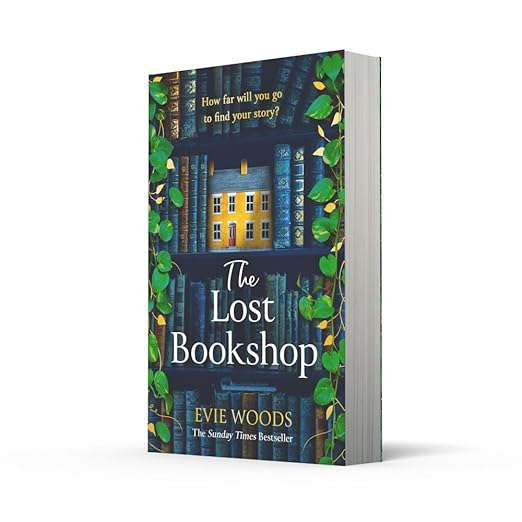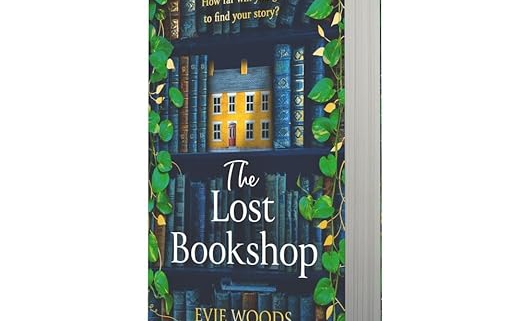In-Depth Review: The Lost Bookshop by Evie Woods
In-Depth Review: The Lost Bookshop by Evie Woods
By Nandy
Synopsis The Lost Bookshop

The Lost Bookshop by Evie Woods is a spellbinding ode to the transformative power of books, weaving together dual timelines, magical realism, and unforgettable characters into a narrative that feels both timeless and urgent. Set against the backdrop of Dublin’s cobblestone streets and Paris’s bohemian charm, the story unfolds through three interconnected perspectives:
- Opaline, a rebellious young woman in 1920s England who flees an arranged marriage to forge her own path. Landing in Paris, she becomes entangled with Sylvia Beach’s iconic Shakespeare and Company bookstore, where she discovers her passion for rare manuscripts and battles societal constraints to protect a literary treasure—a lost manuscript attributed to Emily Brontë.
- Martha, a modern-day Dublin housekeeper escaping an abusive marriage. Hired by the eccentric Madame Bowden, Martha finds solace in a crumbling mansion with a mysterious connection to a vanished bookshop. Her journey of self-reclamation intertwines with her growing curiosity about the shop’s secrets.
- Henry, a bumbling yet endearing academic obsessed with locating Opaline’s lost manuscript. His research leads him to Martha and the enigmatic bookshop, which appears and disappears like a literary phantom, challenging his skepticism and reshaping his understanding of love and legacy.
The novel’s heart lies in the titular bookshop—a magical space that defies time and logic, offering refuge to those who dare to believe in its power. As Opaline, Martha, and Henry navigate betrayal, trauma, and rediscovery, their stories converge in a crescendo of hope, proving that “the thing about books is that they help you imagine a life bigger and better than you could ever dream of.”
Author Background
Evie Woods, pseudonym of Sunday Times bestselling author Evie Gaughan, is a master of blending the ordinary with the extraordinary. Hailing from Ireland’s windswept west coast, Woods infuses her work with Celtic mysticism and a deep reverence for storytelling. Her previous novels, including The Mysterious Bakery on Rue de Paris and The Story Collector, have been praised for their “whimsical charm” and “magical realism that feels grounded in human emotion.”
Woods’ inspiration for The Lost Bookshop stems from her lifelong fascination with literary history and marginalized voices. In interviews, she has cited Sylvia Beach—the real-life founder of Shakespeare and Company—as a muse, alongside her own experiences of finding solace in bookshops during difficult times. This personal connection imbues the novel with authenticity and warmth, making it a love letter to bibliophiles and dreamers alike.
Critical Analysis The Lost Bookshop
1. Plot Structure and Pacing
At 437 pages, The Lost Bookshop balances intricate plotting with lyrical pacing. The dual timelines—1920s Paris/modern Dublin—are deftly interwoven, with Opaline’s historical arc offering rich, atmospheric detail (think smoky cafés and handwritten letters) while Martha and Henry’s contemporary quest injects urgency and wit. Though some critics note the modern timeline’s occasional pacing hiccups, particularly Henry’s initial cluelessness (e.g., forgetting to Google Opaline’s name), these moments are outweighed by the narrative’s overarching momentum.
The magical realism—bookshop portals, sentient books, and spectral librarians—elevates the story from a simple mystery to a metaphysical exploration of how stories shape identity. While skeptics may balk at the abruptness of certain fantastical elements (e.g., Martha’s unexplained ability to “sense” the shop), fans argue these choices mirror the inexplicable magic of reading itself.
2. Character Development
- Opaline: A feminist icon in the making. Her defiance of patriarchal norms—escaping marriage, championing female authors—resonates powerfully, though her romantic subplot with a Parisian artist feels underdeveloped compared to her intellectual triumphs.
- Martha: A survivor whose growth from timid housemaid to confident heroine is the novel’s emotional anchor. Her bond with Madame Bowden, a reclusive ex-actress with a penchant for dramatics, provides both humor and pathos.
- Henry: Initially a caricature of academia (think elbow patches and misplaced priorities), his evolution into a vulnerable, love-struck collaborator is a testament to Woods’ skill in subverting tropes. His dynamic with Martha—a slow-burn romance built on mutual respect—avoids cliché, offering instead a partnership rooted in shared curiosity.
3. Themes and Symbolism
- Books as Liberation: The lost manuscript symbolizes marginalized voices reclaiming their narratives. Opaline’s fight to preserve Emily Brontë’s work mirrors her own struggle for autonomy, while Martha’s discovery of the shop empowers her to rewrite her life.
- Magical Realism as Metaphor: The bookshop’s elusiveness reflects the transient nature of inspiration and the courage required to embrace the unknown. As Henry notes, “It’s not about finding the shop—it’s about letting the shop find you.”
- Intergenerational Healing: Opaline’s legacy—subtly linked to Martha through familial echoes—suggests that stories transcend time, offering solace and guidance across generations.
4. World-Building and Atmosphere
Woods’ Dublin is a character in its own right: rain-soaked, haunted by literary ghosts, and brimming with secret alleyways. The historical sections shine brightest, particularly Opaline’s interactions with Sylvia Beach and the Lost Generation writers. Modern-day Dublin, while occasionally anachronistic (e.g., Henry’s outdated references to 1960s TV icons), still captivates with its blend of grit and whimsy.
Reception and Cultural Impact The Lost Bookshop
Since its 2023 release, The Lost Bookshop has sold over 500,000 copies, earning spots on the Sunday Times and Wall Street Journal bestseller lists. Reader reactions are polarized but passionate:
- Praise: Fans hail it as “a love letter to bibliophiles” and “the Midnight in Paris of books,” celebrating its lush prose and emotional depth. The #LostBookshopChallenge on TikTok, where users share their own “magical bookshop” stories, has amassed 2.1 million views.
- Criticism: Detractors cite uneven pacing and underdeveloped magical elements, though even skeptics admit the finale—a heartrending fusion of timelines—redeems earlier flaws.
Notably, the novel has sparked academic interest for its feminist reimagining of literary history, with universities hosting panels on Opaline’s role as a “proto-Sylvia Plath in a corset.”
Personal Opinion The Lost Bookshop
As a lifelong book lover, The Lost Bookshop felt like stepping into a dream I never wanted to leave. Opaline’s chapters transported me to 1920s Paris, where the smell of aged paper and the sound of typewriters clacking in Shakespeare and Company became visceral. Her determination to protect Brontë’s manuscript—even as the world dismissed her ambitions—left me in tears, not just for her, but for every woman whose voice has been stifled by history.
Martha’s journey struck a deeply personal chord. Her gradual empowerment—from flinching at raised voices to confronting her past with grit—mirrored my own struggles with self-doubt. The scene where she finally enters the bookshop, trembling but resolute, is one I’ve revisited countless times, each reading offering new layers of meaning.
Henry’s academic blunders initially frustrated me (seriously, Google it!), but his transformation from a man obsessed with accolades to one humbled by love felt authentic. His final act—sacrificing his thesis to preserve Opaline’s legacy—is a quiet triumph that encapsulates the novel’s message: stories matter, but so do the people who protect them.
Yes, the magical realism requires suspension of disbelief. No, not every plot thread is neatly tied. But isn’t that true of life? The book’s imperfections make it human, much like the dog-eared novels we cherish despite—or because of—their flaws.
Publication Details The Lost Bookshop
- Title: The Lost Bookshop: The most charming and uplifting novel for 2025 and the perfect gift for book lovers!
- Author: Evie Woods
- Publisher: One More Chapter (HarperCollins)
- Publication Date: June 22, 2023
- Pages: 437
- ISBN: 978-0008609214
- Genres: Historical Fiction, Magical Realism, Contemporary Fiction
- Content Warnings: Domestic abuse, emotional trauma, brief wartime violence
Who Should Read This Book?
- Bibliophiles: For the lush descriptions of rare books and literary history.
- Fans of Dual Timelines: Lovers of The Seven Husbands of Evelyn Hugo or The Clockmaker’s Daughter will adore the interplay between past and present.
- Magical Realism Enthusiasts: If you believe bookshops can be portals, this is your next obsession.
- Survivors and Dreamers: Anyone seeking a story about reclaiming agency and finding light in darkness.
Conclusion The Lost Bookshop
The Lost Bookshop is more than a novel—it’s an incantation. With its blend of historical intrigue, modern resilience, and unabashed love for the written word, it invites readers to believe in the impossible: that a book can change your life, that courage is contagious, and that somewhere, in a hidden corner of the world, a shop full of wonders is waiting just for you.
Evie Woods has crafted a tale that lingers long after the final page, much like the scent of old paper or the memory of a perfect first line. Whether you’re seeking escape, validation, or simply a reason to fall in love with reading again, this book delivers. As Martha learns, “The best stories aren’t the ones we’re given—they’re the ones we dare to write ourselves.”
Rating: ★★★★½ (4.5/5)
Recommendation: Buy it, gift it, and let it remind you why you fell in love with stories in the first place. Then visit your nearest indie bookstore—you never know what magic you might find.
Further Exploration
- Dive into Sylvia Beach’s memoir, Shakespeare and Company, for a nonfiction companion to Opaline’s journey.
- Join the #LostBookshopChallenge on TikTok to share your own literary magic.
- Listen to Woods’ interview on The Bookshop Podcast for behind-the-scenes insights into her research process.
Final Note: In a world that often feels too heavy, The Lost Bookshop is a gentle yet powerful reminder that stories can save us—sometimes by letting us escape, sometimes by helping us return. As Opaline would say, “Darling, the right book always finds you at the right time. Trust the magic.”
- Review Lost Girls: An Unsolved American Mystery by Robert Kolker
- Review: House of Earth and Blood by Sarah J. Maas
- Review: House of Sky and Breath by Sarah J. Maas
- Review: House of Flame and Shadow by Sarah J. Maas
- Review: Let Them Theory
- Review: Great Big Beautiful Life (Reese’s Book Club)
- Review: Sunrise on the Reaping
- Review: The Lost Bookshop


